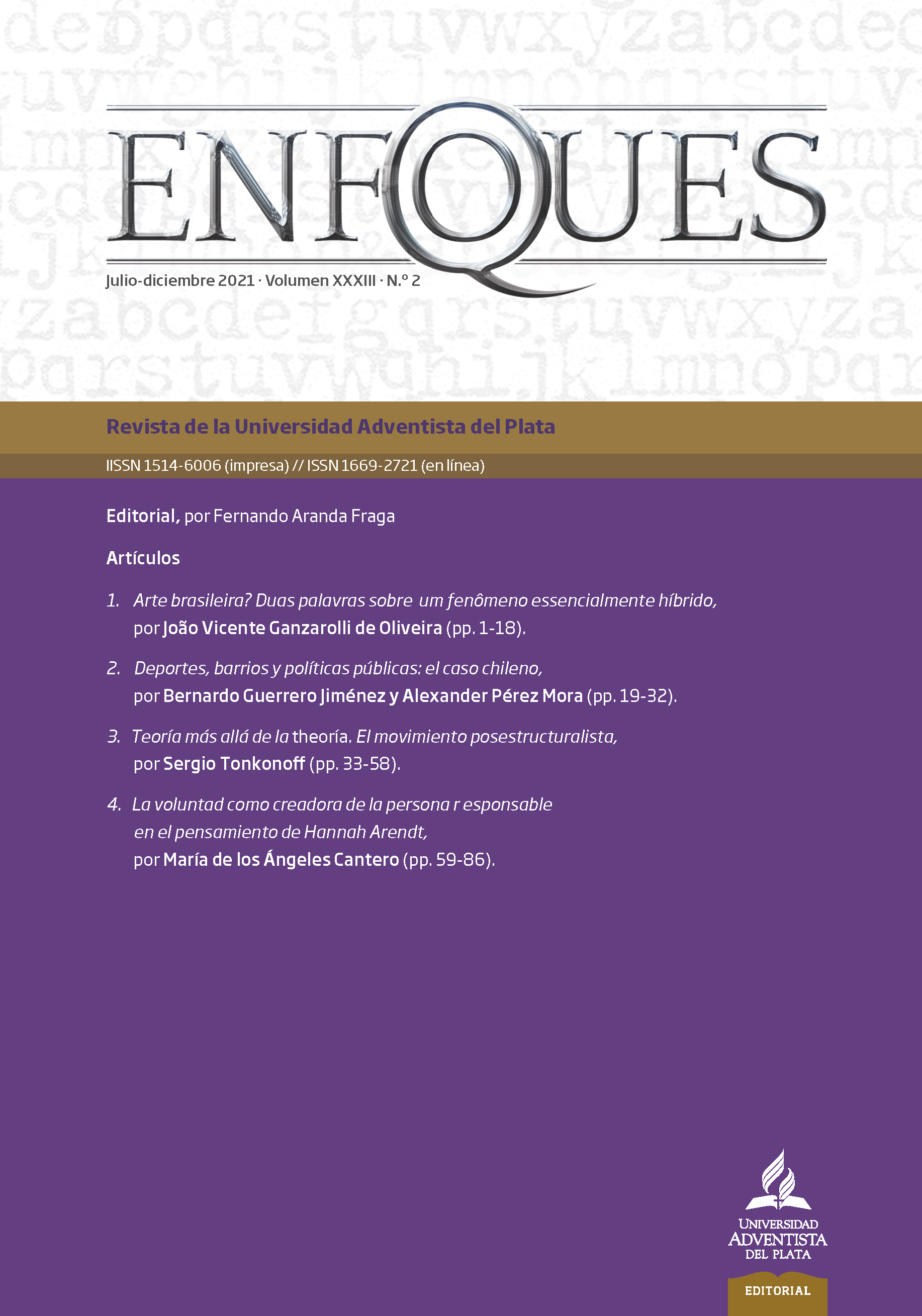Theory beyond theoría. The poststructuralist movement
DOI:
https://doi.org/10.56487/enfoques.v33i2.1013Keywords:
Posestructuralismo, Teoría social, Diferencia, SistemaAbstract
The paper presents a general reading of poststructuralism describing it as a heterogeneous set of theories about the social, the political and the subjective that had structuralism, Freudism and Marxism as complex references. We propose to characterize poststructuralism by its “torsion” of these references, and to distinguish two great stages in the development of its investigations: one linked to the affirmation of radical difference and the criticism of totalizing conceptions of system, and the other one linked to the reconceptualization of systems as multiplicities or not-wholes.In this work we will mainly focus on the first stage, and we will only outline some keyelements for understanding the second one.Downloads
References
Etienne Balibar, “El estructuralismo: ¿una destitución del sujeto?”, Instantes y azares, n.o 4 (2007): 155-172.
Manfred Frank, What is Neo-Structuralism? (Minneapolis: University of Minnesota Press, 1989).
Richard Harland, Superestructuralism: The Philosophy of Structuralism and Post-Structuralism (New York: Routledge, 1987).
Vincent Descombes, “The Ambiguity of the Symbolic”, Theory Culture Society, n.o 3 (1986): 69.
Patrice Maniglier, “The Structuralist Legacy”, en Rossi Braidotti, History of Continental Philosophy (Durham: Acumen, 2010): 81.
Martin Heidegger, Identidad y diferencia (Madrid: Anthropos, 1988).
Michel Foucault, Historia de la sexualidad 2: el uso de los placeres (Buenos Aires: Siglo XXI Editores, 2003).
Ferdinand de Saussure, Curso de lingüística general (Buenos Aires: Losada, 1980).
Kristeva, La révolution du langage poétique (París: Le Seuil, 1974).
Michel Foucault, Vigilar y castigar: el nacimiento de la prisión (Buenos Aires: Siglo XXI Editores, 1989); Michel Foucault, Historia de la sexualidad I: la voluntad de saber (México:
Siglo XXI, 1991).
Gilles Deleuze y Felix Guattari, El anti-Edipo: capitalismo y esquizofrenia (Buenos Aires: Paidós, 1995); Gilles Deleuze y Félix Guattari, Mil mesetas: capitalismo y esquizofrenia (Valencia: Pre-textos, 2002).
Jacques Lacan, El seminario 20: Aún (Buenos Aires: Paidós, 2009).
Judith Butler, Ernesto Laclau y Slavoj Žižek, Contingencia, hegemonía y universalidad: diálogos contemporáneos en la izquierda (Buenos Aires: Fondo de Cultura Económica, 2011).
Louis Althusser, La revolución teórica de Marx (México: Siglo XXI Editores, 1968).
Claude Lévi-Strauss, Antropología estructural (Buenos Aires: Paidós, 1995), 226.
Jacques Lacan, Escritos 1 (Buenos Aires: Siglo Veintiuno Editores, 2010), 448.
Ernesto Laclau y Chantal Mouffe, Hegemonía y estrategia socialista (Buenos Aires: Fondo de Cultura Económica, 2006).
Jean François Lyotard, Economía libidinal (México: Fondo de Cultura Económica, 1990); Jean François Lyotard, Des dispositifs pulsionnels (París: Galilée, 1994).
Deleuze y Guattari, El anti-Edipo, 216.
Me permito remitir a Sergio Tonkonoff, From Tarde to Deleuze and Foucault: The Infinitesimal Revolution (New York: Palgrave Macmillan, 2017).
Louis Althusser, Escritos sobre psicoanálisis: Freud y Lacan (Buenos Aires: Siglo XXI Editores, 1996).
Jacques Lacan, Seminario 23: el sinthome (Buenos Aires: Paidós, 2008); Jacques Lacan, Seminario 16: de un Otro al otro (Buenos Aires: Paidós, 2007).
Sollers, “Ecriture et Révolution”. En Tel Quel: Théorie d’Ensemble (París: Seuil, 1968), 76-79.
Jean Baudrillard, Crítica de la economía política del signo (Buenos Aires: Siglo XXI Editores, 1999).
Foucault, Vigilar y castigar: el nacimiento de la prisión, 203-204.
Deleuze y Guattari, El anti-Edipo, 266-267.
Jacques Derrida, Spectres de Marx (París: Galilée, 1993).
Jacques Derrida, Márgenes de la filosofía (Madrid: Cátedra, 1998).
Jean-François Lyotard, Dérive à partir de Marx et Freud (París: Galilée, 1994).
Julia Kristeva, La révolution du langage poétique (París: Le Seuil, 1974).
Published
Issue
Section
License

This work is licensed under a Creative Commons Attribution-NonCommercial-ShareAlike 4.0 International License.




